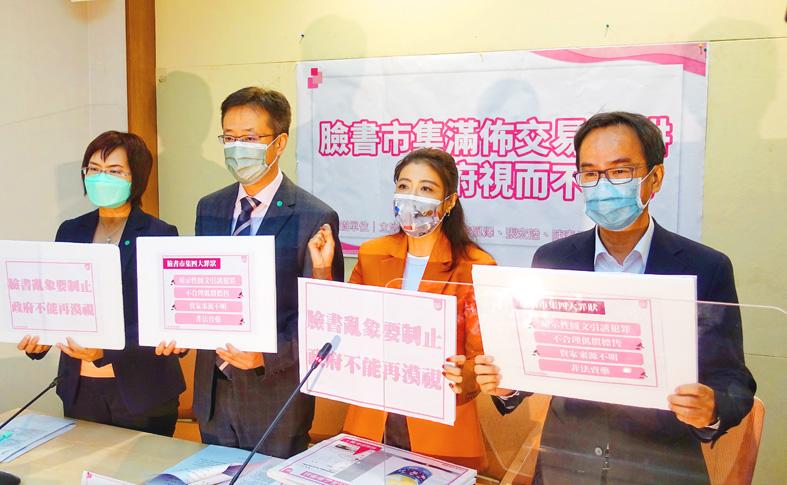Legislators yesterday called for stricter regulation of Facebook Marketplace to address a surge in scams on the peer-to-peer site, calling the government’s current approach ineffective and in need of a bold response.
Democratic Progressive Party (DPP) Legislator Michelle Lin (林楚茵) said that many fraudulent posts on the commerce platform use suggestive images or unreasonably low prices to lure customers, while some do not specify the source of the product they purport to sell.
Some illegally sell medication or drugs, she said, adding that she has seen a town house for sale on the Web site for just NT$320.

Photo: Liu Ming-de, Taipei Times
Although the Ministry of Economic Affairs has regulations governing online retail platforms, it does not have any means to respond to such scams without jurisdiction over Facebook, Lin said.
The government cannot do anything about the marketplace, and yet it still provides Facebook public funds to promote its posts, she said.
The social media giant’s Taiwan office is only responsible for marketing and must send any problems to its corporate headquarters, Lin said.
A week ago the office tried to contact its headquarters, but they have not responded, she said, adding that even legislators’ messages are going unanswered.
“How can the government turn a blind eye to a platform so opposed to Taiwanese law, full of suggestive content and scams?” she asked.
The National Communications Commission (NCC) needs to “muster the courage” to address the issue, DPP Legislator Chen Su-yueh (陳素月) said, adding that the platform must more effectively block inaccurate postings.
Facebook has a social responsibility to its users and to follow local laws, yet on marketplace, pornographic content is readily available, not to mention the sales of illicit drugs, DPP Legislator Chang Hung-lu (張宏陸) said, asking who should be held accountable.
The COVID-19 pandemic has pushed retail online faster than anticipated, making services such as marketplace important public spaces and increasingly favored platforms for scammers, DPP Legislator Lee Kun-tse (李昆澤) said.
The NCC and Department of Commerce keep “kicking the ball back and forth” on regulation, yet it is the NCC’s responsibility to request that a post be taken down, he said.
As digital platforms are not good at self-regulating, governments must step in, National Taipei University of Technology intellectual property institute associate professor Christy Chiang (江雅綺) said.
A foreign-based company such as Facebook can dodge local laws, making it hard to regulate and ensure fair competition, she said, calling for the creation of a regulatory entity.
The Internet lacks a centralized authority, but most sites can be held accountable through their corporate counterpart, NCC Planning Department Director Wang De-wei (王德威) said.
Its borderless nature makes it extremely difficult to manage, but the NCC is working on drafting a digital communications bill based on EU law, he added.
The bill would require Web sites to register locally with a legal representative and require the platforms to self-regulate, while also removing illegal content when requested by local authorities, he said.

A preclearance service to facilitate entry for people traveling to select airports in Japan would be available from Thursday next week to Feb. 25 at Taiwan Taoyuan International Airport, Taoyuan International Airport Corp (TIAC) said on Tuesday. The service was first made available to Taiwanese travelers throughout the winter vacation of 2024 and during the Lunar New Year holiday. In addition to flights to the Japanese cities of Hakodate, Asahikawa, Akita, Sendai, Niigata, Okayama, Takamatsu, Kumamoto and Kagoshima, the service would be available to travelers to Kobe and Oita. The service can be accessed by passengers of 15 flight routes operated by

Alain Robert, known as the "French Spider-Man," praised Alex Honnold as exceptionally well-prepared after the US climber completed a free solo ascent of Taipei 101 yesterday. Robert said Honnold's ascent of the 508m-tall skyscraper in just more than one-and-a-half hours without using safety ropes or equipment was a remarkable achievement. "This is my life," he said in an interview conducted in French, adding that he liked the feeling of being "on the edge of danger." The 63-year-old Frenchman climbed Taipei 101 using ropes in December 2004, taking about four hours to reach the top. On a one-to-10 scale of difficulty, Robert said Taipei 101

Taiwanese and US defense groups are collaborating to introduce deployable, semi-autonomous manufacturing systems for drones and components in a boost to the nation’s supply chain resilience. Taiwan’s G-Tech Optroelectronics Corp subsidiary GTOC and the US’ Aerkomm Inc on Friday announced an agreement with fellow US-based Firestorm Lab to adopt the latter’s xCell, a technology featuring 3D printers fitted in 6.1m container units. The systems enable aerial platforms and parts to be produced in high volumes from dispersed nodes capable of rapid redeployment, to minimize the risk of enemy strikes and to meet field requirements, they said. Firestorm chief technology officer Ian Muceus said

MORE FALL: An investigation into one of Xi’s key cronies, part of a broader ‘anti-corruption’ drive, indicates that he might have a deep distrust in the military, an expert said China’s latest military purge underscores systemic risks in its shift from collective leadership to sole rule under Chinese President Xi Jinping (習近平), and could disrupt its chain of command and military capabilities, a national security official said yesterday. If decisionmaking within the Chinese Communist Party has become “irrational” under one-man rule, the Taiwan Strait and the regional situation must be approached with extreme caution, given unforeseen risks, they added. The anonymous official made the remarks as China’s Central Military Commission Vice Chairman Zhang Youxia (張又俠) and Joint Staff Department Chief of Staff Liu Zhenli (劉振立) were reportedly being investigated for suspected “serious